|
Dusty Dog Reviews The whole project is hip, anti-academic, the poetry of reluctant grown-ups, picking noses in church. An enjoyable romp! Though also serious. |
|
Nick DiSpoldo, Small Press Review (on Children, Churches and Daddies, April 1997) Children, Churches and Daddies is eclectic, alive and is as contemporary as tomorrow’s news. |



|
Kenneth DiMaggio (on cc&d, April 2011) CC&D continues to have an edge with intelligence. It seems like a lot of poetry and small press publications are getting more conservative or just playing it too academically safe. Once in awhile I come across a self-advertized journal on the edge, but the problem is that some of the work just tries to shock you for the hell of it, and only ends up embarrassing you the reader. CC&D has a nice balance; [the] publication takes risks, but can thankfully take them without the juvenile attempt to shock. |
|
from Mike Brennan 12/07/11 I think you are one of the leaders in the indie presses right now and congrats on your dark greatness. |
Volume 240, January 2013
Internet ISSN 1555-1555, print ISSN 1068-5154

see what’s in this issue...
Note that in the print edition of cc&d magazine, all artwork within the pages of the book appear in black and white.
|
Order this issue from our printer as a paperback book (5.5" x 8.5") perfect-bound w/ b&w pages |

poetry
the passionate stuff
When Words FailBruce Matteson
I only have so many words and they are important to me, you know? They are my guns.
|

Spark, art by Peter LaBerge
Slaughtering 8,000 MuslimsFritz Hamilton
Slaughtering 8,000 Muslims is
we’ll have a crusade/ we
Afghanistan/ they’re
string of ugly faces on the
Amin?/ the pope?/ all
progeny to repeat the
AGAIN &
!
|
After NerudaBradley Bates
What can I say in response to a love lost
of memory under the sea? What can I do
so many memories and stories so powerful
cast a breath across the latitude of the sea?
and swim to an unknowable depth, and
a small bubble tinier than a pea? Where can
as seconds pass into minutes into hours to hold you against me for a lifetime?
|

Dark Reflections, art by Rose E. Grier
Checked MatesWilliam Robison
Bicycling Mormons
All in black and white
Helmets to match
Perhaps merely pawns
A white squared dark knight
|
William Robison BioWilliam Robison teaches history at Southeastern Louisiana University and has published considerable nonfiction on early modern England, his most recent work being The Tudors in Film and Television (McFarland, 2012), co-authored with Sue Parrill. For more info, see http://www.tudorsonfilm.com. He is also a musician and a maker of short films, both which the curious can check out at http://www.myspace.com/562067730. Poetry is a newer form of expression for Robison, but recently hwe has had poems accepted by Amethyst Arsenic, amphibi.us, Anemone Sidecar, Apollo’s Lyre, Asinine Poetry, Carcinogenic Poetry, decomP magazinE, Forge, Mayday Magazine, On Spec, and Paddlefish.
|
The DishesBrian Looney
And it piles up I know. A very heaping mountain. I’ve let it go for several days. And
|
| Janet Kuypers reads the Brian Looney poem the Dishes from v240 cc&d magazine live in Chicago |

See YouTube video of magazine editor Janet Kuypers reading this Brian Looney v240 cc&d magazine poem 1/2/13 at the Café Gallery poetry open mic she hosts in Chicago (from the Canon camera) |

Coffee Cup, painting by Brian Forrest
Modern Olympian Ode #1 (1936):
Michael Ceraolo |
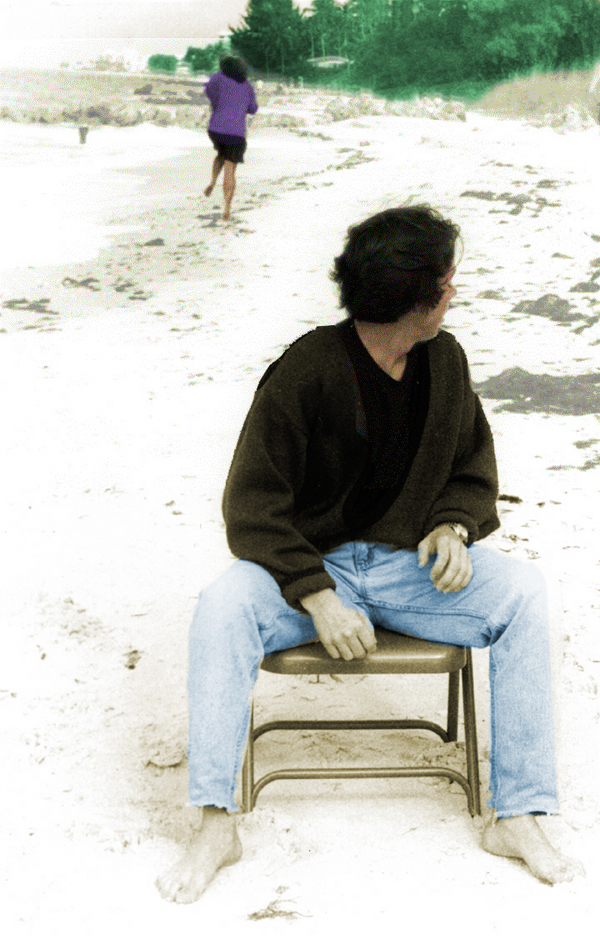
A Failing MindCK Baker
Who are you
You really do
Surely there’s no use
I’m tired
Look around
A tall man
Thank you for listening
|
Memory Screen Andrew H. Oerke
The window that had cataracts of frost on it
I can still close my eyes and Mulligan back
The boy gives the glass globe a good shake to see if the snowflakes
|
BeliefsDavid Michael Schmidt
facts can be twisted and then called truths
|
Untitled (graves)Simon Perchik
These graves listen to you
taking hold your spine, blinded
as if together these bones
already the small stones
|
| Janet Kuypers reads the Simon Perchik poem Untitled (graves) from v240 cc&d magazine live in Chicago |

See YouTube video of magazine editor Janet Kuypers reading this Simon Perchik v240 cc&d magazine poem 1/2/13 at the Café Gallery poetry open mic she hosts in Chicago (from the Canon camera) |
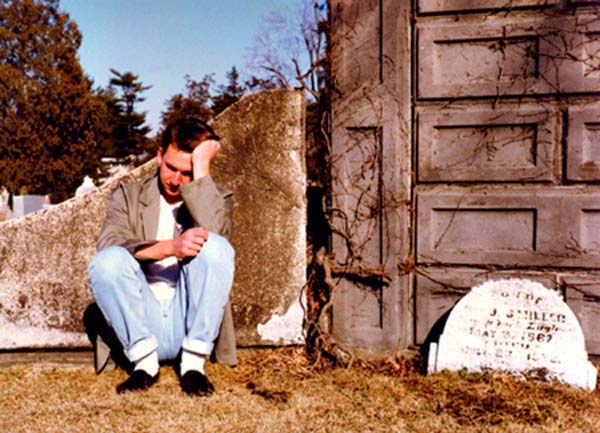
The Check Is In the MailLinda Webb Aceto
Shouldn’tMother Love trump
Still memories
|
| Janet Kuypers reads the Linda Webb Aceto poem the Check is in the Mail from v240 cc&d magazine live in Chicago |

See YouTube video of magazine editor Janet Kuypers reading this Linda Webb Aceto v240 cc&d magazine poem 1/2/13 at the Café Gallery poetry open mic she hosts in Chicago (from the Canon camera) |
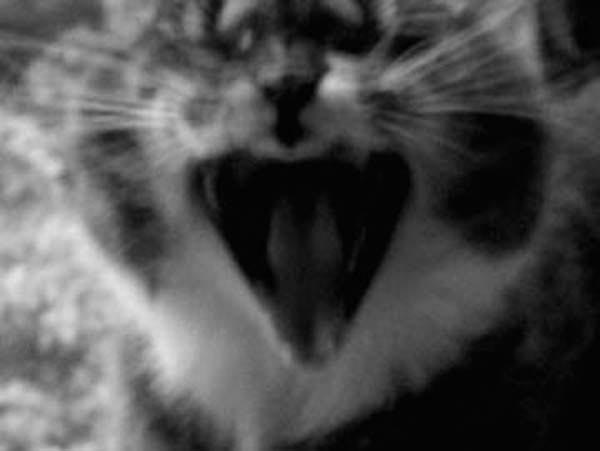
Ferocious, art by Cheryl Townsend
Butterfly Kiss SwitchbladeCEE
He held it to my throat
I’m gonna skip a lot of details
|
a Family ConnectionCopyright R. N. Taber 2012
One day I visited a churchyard
I felt cold, cheated, no feelings
I’d found what I was looking for
I entered, began feeling my way
He said I had the family likeness glad I’d come
|
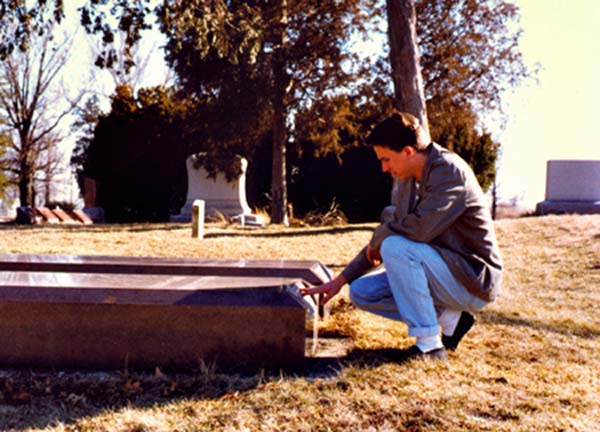
Me and My Father
Ryan Peeters |
DestinationsDana Stamps, II
Going for a two week stay, flying to visit my real father,
and I discovered that I was a stowaway. My father
Airport and its adjacent museum where, as a boy, I
He listened carefully, and then advised
if I do that, they will put me in jail,” not the truth, that I
I took the Greyhound, and I arrived in Dayton
|
Uneven Ground
Janet Kuypers |
found poem
Janet Kuypers |
Hunt the GameJanet Kuyperstwitter-length poem 6/1/12
Men used to
|

See YouTube video of Kuypers reading this poem 9/12/12 at the Café Gallery in Chicago (Canon) |

See YouTube video of Kuypers reading this poem 9/12/12 at the Café Gallery in Chicago (Sony) |

See YouTube video of Kuypers’ “Grocery Store Stories” 9/12/12 at the Café Gallery in Chicago (with this poem; Canon) |

See YouTube video of Kuypers’ “Grocery Store Stories” 9/12/12 at the Café Gallery in Chicago (with this poem; Sony) |

See YouTube video of Kuypers’ open mic 9/12/12 at Gallery Cabaret’s the Café Gallery in Chicago, plus her poetry (including this poem) |
Poverty in AmericaJanet Kuypers5/23/12
A man competing
Wow.
|

|

See YouTube video of Kuypers reading this poem 9/12/12 at the Café Gallery in Chicago (Canon) |

See YouTube video of Kuypers reading this poem 9/12/12 at the Café Gallery in Chicago (Sony) |

See YouTube video of Kuypers’ “Grocery Store Stories” 9/12/12 at the Café Gallery in Chicago (with this poem; Canon) |

See YouTube video of Kuypers’ “Grocery Store Stories” 9/12/12 at the Café Gallery in Chicago (with this poem; Sony) |

See YouTube video of Kuypers’ open mic 9/12/12 at Gallery Cabaret’s the Café Gallery in Chicago, plus her poetry (including this poem) |
Just Saw a CircaJanet Kuypers5/26/12
Just saw a circa
|
On Their WayJanet Kuypers5/26/12
a man today
A coworker today
A bartender in Tunica
And I don’t know
It gets to me
|
| Janet Kuypers reads her poem On Their Way with live piano music by Gary |
| Rather read it? Then read the original writing |

Watch the YouTube video of Kuypers reading this poem at the open mike 6/9/12 at Gallery Cabaret’s the Café Gallery in Chicago (W/ by live piano music from Gary) Canon |

Watch the YouTube video of Kuypers’ open mike 6/9/12 at Gallery Cabaret’s the Café Gallery in Chicago, plus her poetry (w/ live piano from Gary) |
Janet Kuypers Bio
Janet Kuypers has a Communications degree in News/Editorial Journalism (starting in computer science engineering studies) from the UIUC. She had the equivalent of a minor in photography and specialized in creative writing. A portrait photographer for years in the early 1990s, she was also an acquaintance rape workshop facilitator, and she started her publishing career as an editor of two literary magazines. Later she was an art director, webmaster and photographer for a few magazines for a publishing company in Chicago, and this Journalism major was even the final featured poetry performer of 15 poets with a 10 minute feature at the 2006 Society of Professional Journalism Expo’s Chicago Poetry Showcase. This certified minister was even the officiant of a wedding in 2006. |

Blue Green-6, art by Rex Bromfield

essays
& stuff that makes you think
Safe Harbor at the Isle of Lesbos1Jodi McMaster
I have often told the story of moving in 1972 to Prattville, Alabama, at age 11, after living almost five years in Japan and all but the first few months of kindergarten in Department of Defense schools. We lived most of my father’s tour on base at Yokota; the last 18 months were at Kadena AFB in Okinawa.
1 The Isle of Lesbos was the home of Sappho, one of the earliest known female poets, who wrote about her love for other women circa 630 BCE. Her home is where the word “lesbian” comes from. See http://www.sappho.com/poetry/sappho.html for more information. Thanks to Elyce and Gary for pointing out to me that in common usage these days, “lesbo” is a slur.
2 I always pause before using the term, even in quotes. I’m a white, heterosexual female, so it’s not my term to appropriate, but there is some merit to the argument that never saying it gives it more, rather than less, power. Just because I know it doesn’t mean I use it; just because I don’t use it doesn’t mean it’s not out there.
3 It was far later that I figured out the coke warning; she was afraid someone would put LSD in my drink. Why she didn’t just tell me that is a mystery; I’d been through more drug awareness programs in the previous three years than I had on sex education. The military was big on bringing samples in a glass case and burning what was purported to be something that smelled like pot. I’m a bit skeptical now that it was anything other than the “MaryJane” we were told to avoid. I actually did, and am one of the few people I know that’s never tried it.
4 The most offensive term I knew of at the time; maybe others had a wider vocabulary of hate.
5 To be fair, I didn’t learn the term “lipstick lesbians” until I was in my forties. I was aware, though, that there was more to the lesbian population than the stereotypes.
6 Public displays of affection, which included the simple act of holding hands.
7 My theory is that when you meet a straight guy, there’s some split-second spark of recognition in the man that goes something like “I man. You woman. We could have sex.” It happens regardless of the amount of interest the guy may actually have in sleeping with you, although I have noticed it doesn’t seem to happen with much younger men now that my son is in his late twenties, which is a relief. I think that’d just be creepy. It never happens with gay men. I register nothing off when I meet gay women.
8 Not her real name. I don’t have any way to contact her now, and I don’t believe in outing people.
9 Although I have wondered from time to time if flashing her three performances a week for six weeks had any relevance.
10 The bitch.
11 She later told me that there was a period when she dreaded talking to me because it seemed like I was always the bearer of bad news.
12 My husband and I found early in our marriage that we have completely different connotations for “flirting.” For him, there is no possibility of “harmless flirting”; by definition, flirting is with intent to seduce under false pretense. For me, it’s just playing around. We finally agreed on “kibitzing” as an acceptable alternative to convey what I mean when I say flirting.
|

prose
the meat and potatoes stuff
Seeing everything around me, recognizing nothingFritz Hamilton
Seeng everything around me, recognizing nothing, I keep walking, afraid to talk, fearing that I’ll die, the anxiety so great, I know I’m dead soon anyway. I’m not afraid of death, but if this is dying, I can’t take it.
!
|
Suicide at Post Street
Mel Waldman |
BIOMel Waldman, Ph. D.Dr. Mel Waldman is a licensed New York State psychologist and a candidate in Psychoanalysis at the Center for Modern Psychoanalytic Studies (CMPS). He is also a poet, writer, artist, and singer/songwriter. After 9/11, he wrote 4 songs, including “Our Song,” which addresses the tragedy. His stories have appeared in numerous literary reviews and commercial magazines including HAPPY, SWEET ANNIE PRESS, CHILDREN, CHURCHES AND DADDIES and DOWN IN THE DIRT (SCARS PUBLICATIONS), NEW THOUGHT JOURNAL, THE BROOKLYN LITERARY REVIEW, HARDBOILED, HARDBOILED DETECTIVE, DETECTIVE STORY MAGAZINE, ESPIONAGE, and THE SAINT. He is a past winner of the literary GRADIVA AWARD in Psychoanalysis and was nominated for a PUSHCART PRIZE in literature. Periodically, he has given poetry and prose readings and has appeared on national T.V. and cable T.V. He is a member of Mystery Writers of America, Private Eye Writers of America, American Mensa, Ltd., and the American Psychological Association. He is currently working on a mystery novel inspired by Freud’s case studies. Who Killed the Heartbreak Kid?, a mystery novel, was published by iUniverse in February 2006. It can be purchased at www.iuniverse.com/bookstore/, www.bn.com, at /www.amazon.com, and other online bookstores or through local bookstores. Recently, some of his poems have appeared online in THE JERUSALEM POST. Dark Soul of the Millennium, a collection of plays and poetry, was published by World Audience, Inc. in January 2007. It can be purchased at www.worldaudience.org, www.bn.com, at /www.amazon.com, and other online bookstores or through local bookstores. A 7-volume short story collection was published by World Audience, Inc. in June 2007 and can also be purchased online at the above-mentioned sites. |

Mirror 1, art byDavid Michael Jackson

Mirror Painting, art byDavid Michael Jackson
InterrogationEric Burbridge
I smelled his lunch when his breath whistled past the food trapped between his bucked teeth. He had decades of police work embedded in his dark eyes and pitted skin. “You were in on it, Tager.”
|
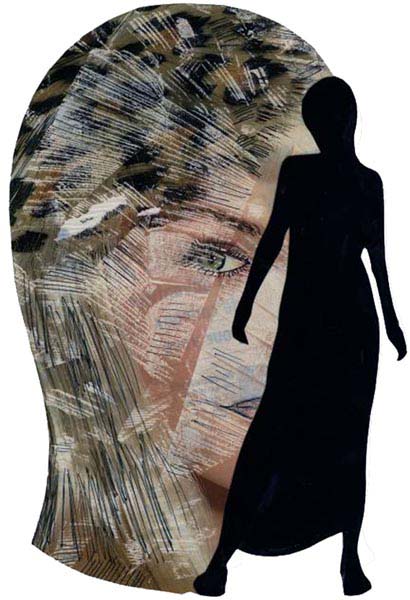
DESEN347-96D, art by <Üzeyir Lokman ÇAYCI
Fifty Dollars to ComfortChris Allen
“My head is humming and it is upon something hard – like a rock. No, not a rock; cement or asphalt, that is more likely. I can’t be sure, my eyes won’t open, but I know I am outside due to the chill in the wind.
“It’s nine o’clock at night and I am back in my apartment. There are about thirty guests here; some are friends of Harold and me. Others are friends of friends, people I have no connection to. Those people should make better witnesses and be more trustworthy in court. “Three years later I am doing pretty good and have gotten my life back on track. The court hearings went well and I was able to slip the guillotine. Harold defended me in court and came across convincingly. Now and then I come back to that low point in my life and find myself laughing about it. As for Lilly’s writing... there isn’t much I can say. However, I am quite curious about her novel.
|
Chris Allen bio (2012)Chris Allen is 21 years old and started writing short stories at the age of eighteen. None of his short stories have been published yet, but has had some interesting work in printed journalism and even his own radio show where he guest starred, “friend of aliens,” Riley Martin from the Howard Stern Show.
|
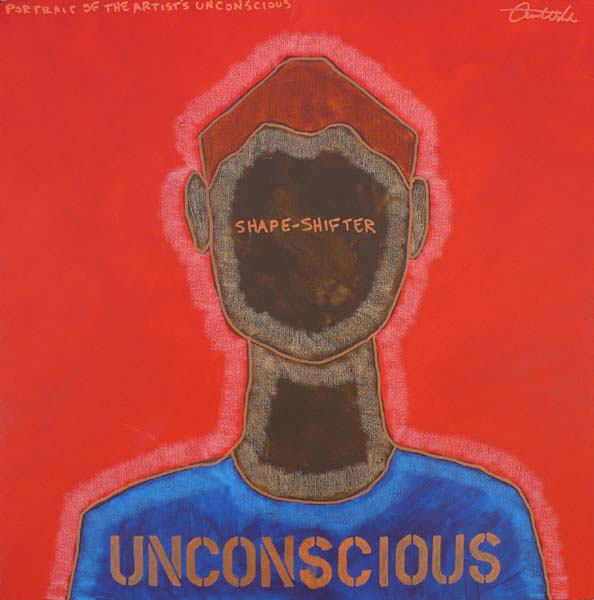
Portrait of the Artist’s Unconscious, art by Aaron Wilder
the PotionJohn Ragusa
“Why don’t you take me out on a date this Saturday night?” Phoebe Fildress asked.
That night, Mervin had Phoebe over for dinner at his apartment. After the meal, she said, “I’m surprised that you asked me over for dinner tonight. I didn’t think you liked me.”
|
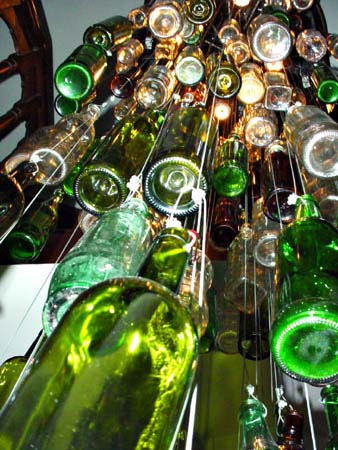

NailedLise Quintana
“I can’t,” Lieber said.
As the car crept down the side street, Lieber looked down the length of each industrial strip mall. Auto body shops, small machinists, storage places: the buildings looked like rusted-out vermin crouching in the headlights’ glare.
|
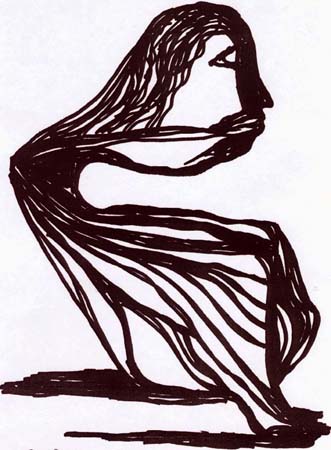
Stress, art by Edward Michael O’Durr SupranowVicz
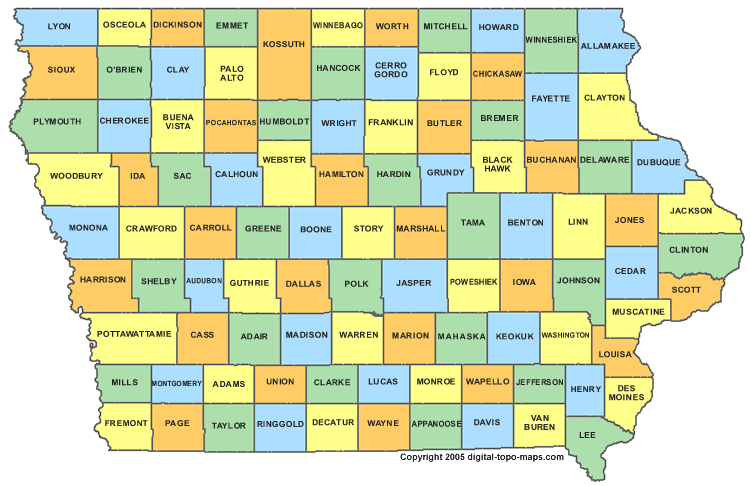
To IowaRobin Wyatt Dunn
You decided not to hang that judge in the ‘30s, god bless you, though he took your farms away. You’re the cruelest factory farmer, though it’s only because you do the most of it, have the most food and know how to share. And perhaps you’ll come to fairer animal husbandry first too, or second or third, as you came to race and gender equality. Iowa, tell me: what will it take? What if we take all your farms from you this time? Have we not already? When will your genial Midwestern demeanor give way to wails for our fallen constitutional pride? When will you join us in not only dissent but in revolution? Revolution, Iowa, you old fuddy duddy breadbasket, the scythe for the musket, the hamburger for the ration, again. Where can we dance, Iowa? Where can we sing? It’s not enough anymore, Iowa. You have to get up off your generous Iowa asses, bless them all. You believed in us so much. When New York was buying off grunts and dodging Civil War drafts, you sent them all, Iowa, you sent them all, believing in your hearts in this strange American dream dying now at our feet, you sent the flower of your young men, all of them, to war for union. What will it take, Iowa? Tell me, damn it, tell me so that I might know what letter to send that will reach your children. What word will stir their hearts from fond devotion to the heedless cry of the stars, this baleful whirl that has been set on us, and you can smell it there too, I know you can, though it may reach there last. Be first, Iowa. I would see your marshalls on their feet, your militias in their stands and your men and women in the streets, if you would be what we need, if you would astonish us all with your unimaginable loyalty again. Be Concord, damn you. Fire a shot, just into the sky. Remove your statehouses and read some Whitman in your baseball fields. Renetwork your laptops and set up a good e-democracy for us all to watch. Throw out the straw poll. Would you not bleed for the first democracy on Earth? One not built on slaves or ignorance? If Davenport became our couch, let Des Moines be our new agora, the town hall Lexington could never quite agree on. Did Kent State scare you that much? Will it only be women’s lib and gay rights forever? That deeper river has been waiting for you, Iowa, you little strange Mesopotamia. Dive into it, Iowa.
|

Baghlan, art by Aaron Wilder
You’re WelcomeP. Keith Boran
Mac was at the super market when the bomb dropped. There was no warning. No emergency broadcast system, no television interruption, no loud speaker announcement in the store – just the loudest boom, followed by a jarring, and most inconvenient, earthquake. The flash of the blast lit up the aisles, making everyone inside manifest their panic through a loud roar of screams. Mac would have died in the resulting calamity had he not been browsing the different brands of toothpaste (there are so many types and flavors) positioned just in front of a large window. The initial blast pushed the shelves over, knocking him to the floor, rendering him unable to move during the ensuing chaos.
|

Spontaneous20111007 Drawing, art by the HA!man of South Africa
Strike NotScott Archer Jones
Las esperanzas engordan pero no maintienen. Hope fattens, but it doesn’t keep you alive.
They had parked the Crusher in a byway beside the river road, on a tributary that fed down east into the Rio Grande. The little river carried only snowmelt just now, fast but thin, quick and not yet quiet as it would be in summer. Cottonwoods stood up shaggy and gray on all sides, the emigrants who had survived in a dry canyon by burrowing their feet into the river.
Across the little bridge, he found his crew straggling back from lunch, smoking and laughing together as they crossed the blacktop. Frankie gave him his burger wrapped in paper, and forty-three cents in change. He also gave David a quizzical glance. “So, you were over at the house. Maybe you were visiting an abularia, no?
By mid afternoon they had demolished all the cars and loaded them up on transport. The crew raked up the litter from their crushing. David stood, hands on his hips, watched the blank face of the adobe. After some consideration he said to Frankie, “I think I’ll get some water to prime the broke pump. When you’re done, get Mickey to load the tractor. I’ll be back before you’re finished. Then we’ll all go down to the highway yard to park for the night.” Lame excuse. Who needed water for a busted pump? The crew was ready to go when he got back to the Crusher. He poured the water on the ground near a tire, out of sight of the adobe. Then he handed the bucket to Mickey. “Set this down on the porch of the casita over there. Then lead by taking the first semi down the canyon.”
|

Rogue Boulder, photograph by Brian Hosey and Lauren Braden
TorchesAmelia Holden
Teacher pushes the alarm snooze button, rolls over, remembers parent teacher conferences tonight. Teacher throws cover off and trudges to the shower.
|
Amelia Holden Bio (20121026)Amelia Holden is a high school English teacher and graduate student who writes because she feels her students deserve better than Twilight. She is happily married and plays Super Woman to her son’s brilliant Incredibly Hulk portrayal. She is currently finishing her first novel.
|
You Check is In the MailBob JohnstonCase No. GC834982 Lafferty, Thomas J. Male White 65 U.S. citizen
He limped slowly around the room. One step from the sink to the bed, two steps along the bed, one step to the flyspecked window, and back to the sink. Each time he went to the window, he peered out into the street. Dark out there, dirty brown fog, street lights already on at four o’clock.
|
Bob Johnston bioBob Johnston is a retired petroleum engineer and translator of Russian scientific literature. He waited until his sixtieth year to start writing fiction and poetry, and over the next thirty years he has been trying to catch up. He lives in the original Las Vegas, New Mexico with his wife, three cats, and some hope of completing his memoirs and the Great American Novel.
|

Debra Purdy Kong, writer, British Columbia, Canada I like the magazine a lot. I like the spacious lay-out and the different coloured pages and the variety of writer’s styles. Too many literary magazines read as if everyone graduated from the same course. We need to collect more voices like these and send them everywhere.
Children, Churches and Daddies. It speaks for itself. Write to Scars Publications to submit poetry, prose and artwork to Children, Churches and Daddies literary magazine, or to inquire about having your own chapbook, and maybe a few reviews like these.
what is veganism? A vegan (VEE-gun) is someone who does not consume any animal products. While vegetarians avoid flesh foods, vegans don’t consume dairy or egg products, as well as animal products in clothing and other sources. why veganism? This cruelty-free lifestyle provides many benefits, to animals, the environment and to ourselves. The meat and dairy industry abuses billions of animals. Animal agriculture takes an enormous toll on the land. Consumtion of animal products has been linked to heart disease, colon and breast cancer, osteoporosis, diabetes and a host of other conditions. so what is vegan action?
We can succeed in shifting agriculture away from factory farming, saving millions, or even billions of chickens, cows, pigs, sheep turkeys and other animals from cruelty. A vegan, cruelty-free lifestyle may be the most important step a person can take towards creatin a more just and compassionate society. Contact us for membership information, t-shirt sales or donations.
vegan action
Children, Churches and Daddies no longer distributes free contributor’s copies of issues. In order to receive issues of Children, Churches and Daddies, contact Janet Kuypers at the cc&d e-mail addres. Free electronic subscriptions are available via email. All you need to do is email ccandd@scars.tv... and ask to be added to the free cc+d electronic subscription mailing list. And you can still see issues every month at the Children, Churches and Daddies website, located at http://scars.tv
MIT Vegetarian Support Group (VSG)
functions: We also have a discussion group for all issues related to vegetarianism, which currently has about 150 members, many of whom are outside the Boston area. The group is focusing more toward outreach and evolving from what it has been in years past. We welcome new members, as well as the opportunity to inform people about the benefits of vegetarianism, to our health, the environment, animal welfare, and a variety of other issues.
Dusty Dog Reviews: These poems document a very complicated internal response to the feminine side of social existence. And as the book proceeds the poems become increasingly psychologically complex and, ultimately, fascinating and genuinely rewarding.
Dusty Dog Reviews: She opens with a poem of her own devising, which has that wintry atmosphere demonstrated in the movie version of Boris Pasternak’s Doctor Zhivago. The atmosphere of wintry white and cold, gloriously murderous cold, stark raging cold, numbing and brutalizing cold, appears almost as a character who announces to his audience, “Wisdom occurs only after a laboriously magnificent disappointment.” Alas, that our Dusty Dog for mat cannot do justice to Ms. Kuypers’ very personal layering of her poem across the page.
Fithian Press, Santa Barbara, CA Indeed, there’s a healthy balance here between wit and dark vision, romance and reality, just as there’s a good balance between words and graphics. The work shows brave self-exploration, and serves as a reminder of mortality and the fragile beauty of friendship.
Mark Blickley, writer You Have to be Published to be Appreciated. Do you want to be heard? Contact Children, Churches and Daddies about book or chapbook publishing. These reviews can be yours. Scars Publications, attention J. Kuypers. We’re only an e-mail away. Write to us.
The Center for Renewable Energy and Sustainable Technology The Solar Energy Research & Education Foundation (SEREF), a non-profit organization based in Washington, D.C., established on Earth Day 1993 the Center for Renewable Energy and Sustainable Technology (CREST) as its central project. CREST’s three principal projects are to provide: * on-site training and education workshops on the sustainable development interconnections of energy, economics and environment; * on-line distance learning/training resources on CREST’s SOLSTICE computer, available from 144 countries through email and the Internet; * on-disc training and educational resources through the use of interactive multimedia applications on CD-ROM computer discs - showcasing current achievements and future opportunities in sustainable energy development. The CREST staff also does “on the road” presentations, demonstrations, and workshops showcasing its activities and available resources. For More Information Please Contact: Deborah Anderson dja@crest.org or (202) 289-0061
Dorrance Publishing Co., Pittsburgh, PA want a review like this? contact scars about getting your own book published.
 The magazine Children Churches and Daddies is Copyright © 1993 through 2013 Scars Publications and Design. The rights of the individual pieces remain with the authors. No material may be reprinted without express permission from the author. 
Okay, nilla wafer. Listen up and listen good. How to save your life. Submit, or I’ll have to kill you.
Dorrance Publishing Co., Pittsburgh, PA: “Hope Chest in the Attic” captures the complexity of human nature and reveals startling yet profound discernments about the travesties that surge through the course of life. This collection of poetry, prose and artwork reflects sensitivity toward feminist issues concerning abuse, sexism and equality. It also probes the emotional torrent that people may experience as a reaction to the delicate topics of death, love and family. “Chain Smoking” depicts the emotional distress that afflicted a friend while he struggled to clarify his sexual ambiguity. Not only does this thought-provoking profile address the plight that homosexuals face in a homophobic society, it also characterizes the essence of friendship. “The room of the rape” is a passionate representation of the suffering rape victims experience. Vivid descriptions, rich symbolism, and candid expressions paint a shocking portrait of victory over the gripping fear that consumes the soul after a painful exploitation.
Dusty Dog Reviews (on Without You): She open with a poem of her own devising, which has that wintry atmosphere demonstrated in the movie version of Boris Pasternak’s Doctor Zhivago. The atmosphere of wintry white and cold, gloriously murderous cold, stark raging cold, numbing and brutalizing cold, appears almost as a character who announces to his audience, “Wisdom occurs only after a laboriously magnificent disappointment.” Alas, that our Dusty Dog for mat cannot do justice to Ms. Kuypers’ very personal layering of her poem across the page.
|
 Iowa, you boldest defender of Union, when will you come again to this our new war under our rivers and in the breath of each of us?
Iowa, you boldest defender of Union, when will you come again to this our new war under our rivers and in the breath of each of us?